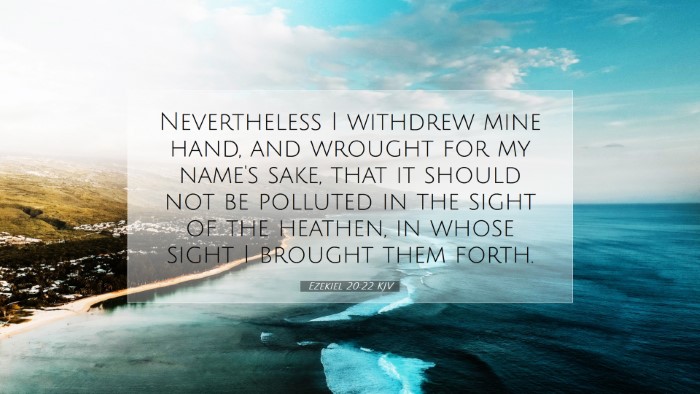Ezekiel 20:22 Commentary
The verse Ezekiel 20:22 states:
"But I withdrew my hand, and acted for my name's sake, that it should not be profaned in the sight of the nations, in whose sight I had brought them out."
This verse presents a profound insight into God's character and His interactions with His people, especially in the context of their disobedience and the consequences that followed. Below is a summarized commentary from several public domain sources.
1. Contextual Overview
Ezekiel's ministry occurs during a time of great turmoil for Israel. The Israelites are in Babylonian exile, and the prophet emphasizes God's judgment upon His people due to their unfaithfulness. In Chapter 20, Ezekiel recounts Israel's history, highlighting both God's grace and their rebellion.
2. God's Forbearance and Mercy
In this specific verse, we see a powerful expression of God's mercy. Matthew Henry comments that God's decision to withdraw His hand signifies His restraint from executing total judgment. He refrains from obliterating Israel completely even in the face of their repeated sins. The essence of God’s character is encapsulated here—His unwillingness to destroy His people despite their failure.
2.1 Preservation for His Name's Sake
Albert Barnes emphasizes the critical nature of God acting for His name's sake. In ancient Near Eastern culture, names were representative of character and reputation. Therefore, to act for His name's sake means that God was more concerned with His glory among the nations than merely punishing Israel. This shows that God's covenant relationship binds Him to His people, compelling Him to exhibit mercy rather than total retribution.
3. Theological Implications
This verse opens up a rich theological dialogue about divine justice and mercy. Adam Clarke explains that such duality in God's actions reflects the tension inherent in His nature—He is holy and just, yet also loving and merciful. The fact that God withholds judgment demonstrates His patience and His desire for repentance. It emphasizes that God actively seeks a relationship with His people and is willing to endure their shortcomings rather than abandon them altogether.
3.1 The Nature of God's Promises
In light of God's covenant with Israel, this act of mercy reinforces the idea that God's promises remain intact despite human failures. The covenant is not merely conditional based on Israel’s adherence but reflects God’s enduring faithfulness. As Henry notes, “God’s promises are not based on a corruptible character but on His eternal faithfulness.”
4. Practical Applications
Pastors and theologians should note the relevance of Ezekiel 20:22 for contemporary faith communities. The notion that God acts for His name’s sake serves as a foundational reminder for believers about resilience in the face of personal or communal failures. Here are several applications:
- Divine Forgiveness: Emphasize the availability of grace and forgiveness. Just as God offered Israel a chance for repentance, communities today can reflect on the persistent mercy of God.
- Hope for Restoration: No matter the situation, believers can retain hope for restoration. Just as God withheld judgment for His name’s sake, He desires to restore rather than destroy.
- Reverence for God's Name: Encourage congregants to live in a manner that honors God's name, recognizing that how they represent Him has implications for their witness to the world.
5. Conclusion
Ezekiel 20:22 serves as a testament to God's complex character—balancing justice with unparalleled mercy. The insights gathered from Matthew Henry, Albert Barnes, and Adam Clarke provide a multi-faceted understanding of how God interacts with His people and the importance of maintaining His name’s integrity among the nations. As students, pastors, and scholars delve deeper into this rich text, they are reminded of the continual call to faithfulness and the assurance of God's everlasting presence, even amidst human failure.


